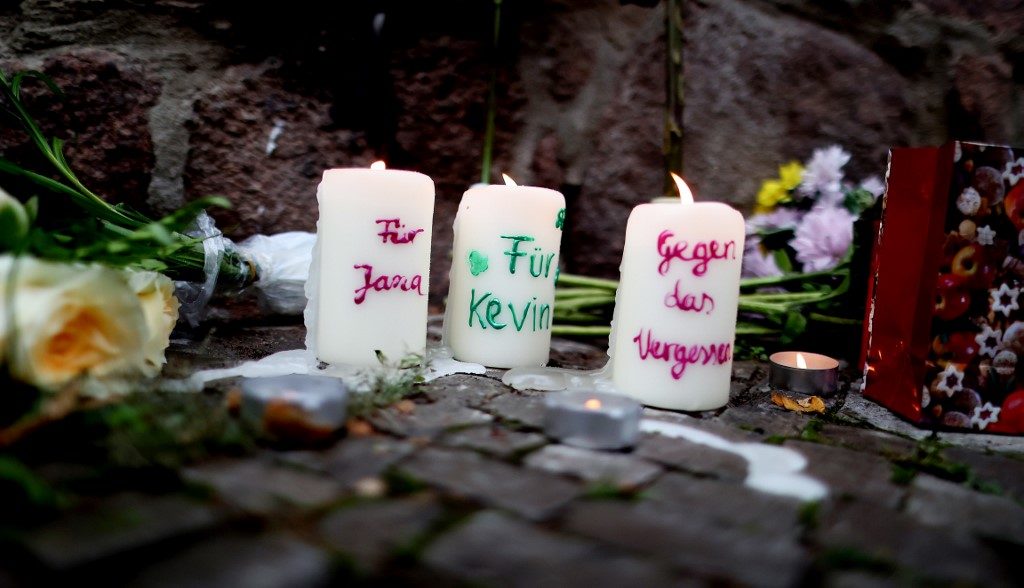SUMMARY
This is AI generated summarization, which may have errors. For context, always refer to the full article.

A German court is to hand down its verdict Monday, December 21, on a deadly far-right attack in Halle last year that nearly became the country’s worst anti-Semitic atrocity since World War II.
A bolted door at the eastern city’s synagogue with 52 worshippers inside marking Yad Vashem, the holiest day of the Jewish year, was the only thing that prevented a heavily armed assailant from carrying out a planned bloodbath, prosecutors say.
After failing to storm the temple on October 9, 2019, the attacker shot dead a female passer-by and a man at a kebab shop instead.
During his 5-month trial, far-right defendant Stephan Balliet, 28, has denied the Holocaust in open court – a crime in Germany – and expressed no remorse to those targeted, many of whom are co-plaintiffs in the case.
“The attack on the synagogue in Halle was one of the most repulsive anti-Semitic acts since World War II,” prosecutor Kai Lohse told the court in the nearby eastern city of Magdeburg as the trial wrapped up.
The prosecution has demanded life in prison for Balliet. His defence team has asked presiding judge Ursula Mertens only for a “fair sentence.”
‘They are my enemies’
Lohse said Balliet had acted on the basis of a “racist, xenophobic, and anti-Semitic ideology” to carry out an attack against not only those he killed but “Jewish life in Germany as a whole.”
The events that unfolded were like a “nightmare”, he added.
“At the end of this nightmare, the perpetrator murdered two people and injured and traumatized numerous others.”
During the trial, Balliet insisted that “attacking the synagogue was not a mistake, they are my enemies.”
Dressed in military garb, he filmed the attack and broadcast it on the internet, prefacing it with a manifesto espousing his misogynist, neo-fascist ideology.
The attack bore some of the hallmarks of two carried out and similarly live-streamed some months earlier in Christchurch, New Zealand by Brenton Tarrant, who killed 51 people. Balliet cited Tarrant as an inspiration.
He has been charged with two counts of murder and multiple counts of attempted murder in a case that has deeply rattled the country and fueled fears about rising right-wing extremism and anti-Jewish violence, 75 years after the end of the Nazi era.
Israel’s ambassador to Germany, Jeremy Issacharoff, called the attack “a very, very alarming moment in German history.”
“If that guy would have been able to get into a synagogue… it would have had a tremendous impact on German identity after the war and the fight against anti-Semitism,” he told Agence France-Prese (AFP) in an interview.
“I hope and trust that the German court will do the right thing and make the right decision. Anti-Semitism is indeed a phenomenon that attacks the very democratic essence of Germany and I think that is the thing that is so important to protect.”
‘Without emotion’
The government’s point man against anti-Semitism, Felix Klein, called the trial “a good opportunity to bring about debate in society about anti-Semitism.”
Crimes targeting Jews and their belief have risen steadily in Germany in recent years, with 2,032 offenses recorded in 2019, up 13% on the previous year.
Meanwhile a string of far-right terrorist attacks have shocked Germany including the assassination of pro-refugee politician Walter Luebcke at his home in June 2019 and the murder in the western city of Hanau of 9 people of migrant origin in February.
Baillet “described the fatal shots fired at his two victims in Halle without emotion” and appeared disappointed that he had failed in his attempt to enter the synagogue, psychiatrist Norbert Leygraf said of the defendant in an evaluation.
He said Balliet suffered from symptoms of schizophrenia, paranoia and autism preventing him from having “empathy with others” while feeling “superior to others.” – Rappler.com
Add a comment
How does this make you feel?
There are no comments yet. Add your comment to start the conversation.